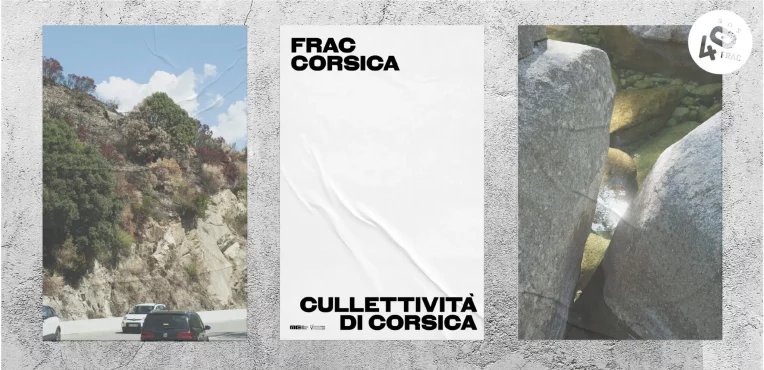NEBBIO REGION
Devoted to the Nebbiu, the 2023-24 Taurus Prize focused on projects that foreground this mountainous, coastal region of the Mediterranean island.
Its name is derived from the nebulous formations that can be seen before sunrise, when the hot air from the sea meets the cooler air coming down from the Corsican mountains.
Selection committee
All projects were considered by an independent jury, made up this year of Xavier Franceschi, Juana Macari, Prisca Meslier and Antoine Viviani. Together, recognizing it for its relevance to the area of research, they chose the project The Choirs of Nebbio, by Ufuoma Essi.
Xavier Franceschi
From 1991 to 2002, Xavier Franceschi was the director of the Centre d’art contemporain de Brétigny (Essonne), where he organised solo exhibitions of Claude Closky, Ghada Amer, Carsten Höller, Maurizio Cattelan, Pierre Bismuth and Bojan Sarcevič, amongst others. In 2002, he took the helm of the public commissions for the the Délégation aux Arts Plastiques of the Culture and Communication Ministry. In this capacity, he spearheaded numerous projects and worked to enrich the national collections through the Centre National des Arts Plastiques (CNAP).
In 2006, he became the director at the Frac Île-de-France, a post he held until 2022. He developed a multi-site project for the Frac, maintaining its historic venue, Le Plateau (Paris), and establishing a second site in Rentilly (Seine-et-Marne) while opening a new storage in Romainville (Seine-St-Denis) in June 2021. Lastly, he acted as Vice-Chairman of Tram, the Paris/Île-de-France, and is part of the Board of Platform, which gathers directors from all Fonds Régionaux d’Art Contemporain in France.
Juana Macari
Juana Macari has been appointed the director of Una Volta, in Bastia, in 2015. She has spearheaded a varied programme, focused on photography, installations, comic books, illustration, and events, including BD Bastia and Cinetica, an animated film festival, alongside art residencies and learning projects. She holds a degree in History from Paris IV – Sorbonne, and in Sociology & Anthropology from Paris VII. Prior to her position, and from 2009, she held a position at the Centre National de Creation Musicale Voce, in Pigna, Corsica.
Prisca Meslier
Prisca Meslier is a freelance curator and the director of De Renava. A graduate from the Sorbonne University and the École du Louvre in art history and archaeology, Prisca worked as an art advisor in charge of private collections in London, Abu Dhabi and New York. In 2022, she co-founded the De Renava biennale with Dumè Marcellesi, which brings important figures of contemporary art in the historical context of Bonifacio, in South Corsica. De Renava collaborates with major public and private institutions such as the Center Pompidou, the Sorigué Foundation or the FRAC Corsica.
Antoine Viviani
Antoine Viviani is a filmmaker and multidisciplinary artist based in Paris. His work, whether through documentary filmmaking, expanded cinema or immersive installations, questions our mental perception of reality and its relationship to technology. It has been exhibited in various institutions such as the Sensory Ethnographic Lab at Harvard, The Tisch School, the National Gallery of Iceland, the Gaité Lyrique in Paris, NYU, and awarded and selected at films festivals like Sundance, IDFA, CPH:Dox, Visions du réel, etc. He was one of the 2022 laureates of the Villa Albertine residency in the US and of the Magnetic Residency / Fluxus Program in the UK.
Partners
Ufuoma Essi’s project will be exhibited in two institutions:
Musée des Beaux-Arts Le Locle
The Musée des Beaux-Arts Le Locle (MBAL) is an internationally acclaimed institution. Created by a group of enthusiasts who founded the Société des Amis des arts du Locle in 1862, the MBAL moved to its current Art Nouveau building, designed by architects Jean and Eugène Crivelli, in 1913. The museum’s collection, comprising 3,500 items, includes paintings, drawings, watercolours, sculptures and prints by Swiss and international artists from the 17th to the 21st century. It is the result of over a hundred years of generous donations, long loans and purchases, and is presented to the public in temporary exhibitions.
Since 1946, the MBAL has paid particular attention to printed matters, and initiated in 1992 the Contemporary Triennale of Printed Art, which has brought together artists from all over the world. From 2011 to 2014, the MBAL underwent an unprecedented renovation to improve the conservation of its collections and galleries. Under the direction of Nathalie Herschdorfer, in 2021, the MBAL launched a new exclusively virtual exhibition space: ORBIT_E. With its new director Dr. Federica Chiocchetti, a specialist in the relationship between text and images, MBAL is offering temporary exhibitions that bring together historic artists from the collection with contemporary voices.

Una Volta in Bastia, with the support of FRAC Corsica
The FRAC Corsica (regional fund for contemporary art), a French institution in the Mediterranean, is the island’s first art institution to become part of a national and European network. It comprises a collection of international contemporary art of 523 works. It is the second-largest public art collection in Corsica, after the Palais Fesch – Musée des Beaux-Arts. The collection is structured around two main themes: the Anthropocene, which is renewing approaches to landscape and giving the environment pride of place, and identity & territory, an area of research which critically engages both history and the present times. The 1980s and 1990s are strongly represented in the collection, which is now looking ahead towards the future.
The FRAC Corsica shares the works in its collection throughout the Corsican Island by means of exhibitions, programmes, and outreach activities aimed at a wide range of audiences. Its learning department designs and runs creative workshops for young people and residents of nursing homes. To promote a shared understanding of contemporary art, it organises training courses and discussions around works of art. It takes an active part in institutional exchanges and partnerships, collaborating with museums, universities and cultural associations locally and internationally, particularly within the Mediterranean.

